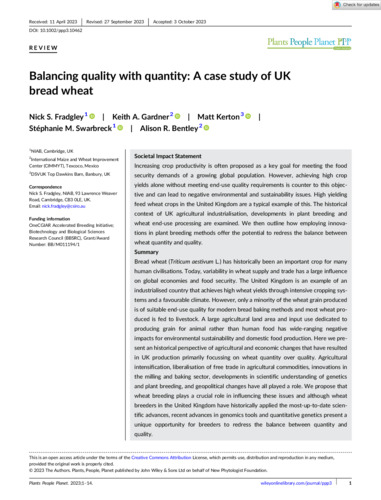Balancing quality with quantity: a case study of UK bread wheat
Abstract
Societal Impact Statement: Increasing crop productivity is often proposed as a key goal for meeting the food security demands of a growing global population. However, achieving high crop yields alone without meeting end-use quality requirements is counter to this objective and can lead to negative environmental and sustainability issues. High yielding feed wheat crops in the United Kingdom are a typical example of this. The historical context of UK agricultural industrialisation, developments in plant breeding and wheat end-use processing are examined. We then outline how employing innovations in plant breeding methods offer the potential to redress the balance between wheat quantity and quality. Summary: Bread wheat (Triticum aestivum L.) has historically been an important crop for many human civilisations. Today, variability in wheat supply and trade has a large influence on global economies and food security. The United Kingdom is an example of an industrialised country that achieves high wheat yields through intensive cropping systems and a favourable climate. However, only a minority of the wheat grain produced is of suitable end-use quality for modern bread baking methods and most wheat produced is fed to livestock. A large agricultural land area and input use dedicated to producing grain for animal rather than human food has wide-ranging negative impacts for environmental sustainability and domestic food production. Here we present an historical perspective of agricultural and economic changes that have resulted in UK production primarily focussing on wheat quantity over quality. Agricultural intensification, liberalisation of free trade in agricultural commodities, innovations in the milling and baking sector, developments in scientific understanding of genetics and plant breeding, and geopolitical changes have all played a role. We propose that wheat breeding plays a crucial role in influencing these issues and although wheat breeders in the United Kingdom have historically applied the most-up-to-date scientific advances, recent advances in genomics tools and quantitative genetics present a unique opportunity for breeders to redress the balance between quantity and quality.

